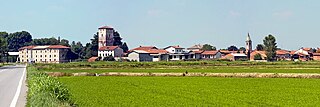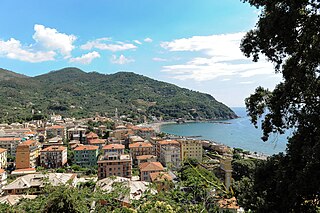
Alcamo is the fourth-largest town and commune of the Province of Trapani, Sicily, with a population of 44.925 inhabitants. It is on the borderline with the Metropolitan City of Palermo at a distance of about 50 kilometres from Palermo and Trapani.

San Gimignano is a small walled medieval hill town in the province of Siena, Tuscany, north-central Italy. Known as the Town of Fine Towers, San Gimignano is famous for its medieval architecture, unique in the preservation of about a dozen of its tower houses, which, with its hilltop setting and encircling walls, form "an unforgettable skyline". Within the walls, the well-preserved buildings include notable examples of both Romanesque and Gothic architecture, with outstanding examples of secular buildings as well as churches. The Palazzo Comunale, the Collegiate Church and Church of Sant' Agostino contain frescos, including cycles dating from the 14th and 15th centuries. The "Historic Centre of San Gimignano" is a UNESCO World Heritage Site. The town also is known for saffron, the Golden Ham, pecorino cheese and its white wine, Vernaccia di San Gimignano, produced from the ancient variety of Vernaccia grape which is grown on the sandstone hillsides of the area.

The province of L'Aquila is the largest, most mountainous and least densely populated province of the Abruzzo region of Italy. It comprises about half the landmass of Abruzzo and occupies the western part of the region. It has borders with the provinces of Teramo to the north, Pescara and Chieti to the east, Isernia to the south and Frosinone, Rome and Rieti to the west. Its capital is the city of L'Aquila.

Grosseto is a comune in the central Italian region of Tuscany, the capital of the province of Grosseto. The city lies 14 kilometres from the Tyrrhenian Sea, in the Maremma, at the centre of an alluvial plain on the Ombrone river.

Greccio is an old hilltown and comune of the province of Rieti in the Italian region of Lazio, overhanging the Rieti Valley on a spur of the Monti Sabini, a sub-range of the Apennines, about 16 kilometres by road northwest of Rieti, the nearest large town.

Chioggia is a coastal town and comune of the Metropolitan City of Venice in the Veneto region of northern Italy.

Iglesias is a comune and city in the province of South Sardinia, Italy. It was co-capital of the province of Carbonia-Iglesias with Carbonia, and the province's second-largest community.

Montecatini Val di Cecina is a small hilltown and comune in the province of Pisa in Tuscany. Located approximately 60 kilometres south of Pisa, the medieval town sits on the Poggio la Croce hill overlooking the Cecina Valley and the larger hilltown of Volterra, which lies just 15 km away.

Pacentro is a comune of 1,279 inhabitants of the province of L'Aquila in Abruzzo, Italy. It is a well-preserved historic medieval village located in central Italy, several kilometers from the City of Sulmona about 170 kilometres (110 mi) east of Rome. It is one of I Borghi più belli d'Italia.

Casamassima is a town and comune of 19,786 inhabitants in the Metropolitan City of Bari, in Apulia, southern Italy. Is also called "The Blue Town". The town is located inland from the Italian coastline, thrives and is built on agriculture, primarily that of wine, olives and almond production. Founded around the seventh and eighth centuries, the village started as a Roman encampment, according to legend.

Sant'Ambrogio di Torino is a comune (municipality) in the Metropolitan City of Turin in the Italian region Piedmont, located about 25 km west of Turin in the Susa Valley.

Mandello Vitta is a comune (municipality) in the Province of Novara in the Italian region Piedmont, located about 80 kilometres (50 mi) northeast of Turin and about 13 kilometres (8 mi) northwest of Novara.
Montemagno is a comune (municipality) in the Province of Asti in the Italian region Piedmont, located about 50 kilometres (31 mi) east of Turin and about 13 kilometres (8 mi) northeast of Asti. As of 31 December 2010 it had a population of 1,228 and an area of 15.9 square kilometres (6.1 sq mi).

Levanto is a comune (municipality) in the province of La Spezia, in the Italian region of Liguria, located almost 90 kilometres (56 mi) southeast of Genoa and about 20 kilometres (12 mi) northwest of La Spezia.

Gromo is a comune (municipality) in the Province of Bergamo in the Italian region of Lombardy, located about 80 kilometres (50 mi) northeast of Milan and about 35 kilometres (22 mi) northeast of Bergamo. As of 31 December 2004, it had a population of 1,246 and an area of 20.0 square kilometres (7.7 sq mi).

Molteno is a comune (municipality) and a hill-top town in the Province of Lecco in the Italian region Lombardy, located about 35 kilometres (22 mi) northeast of Milan and about 11 kilometres (7 mi) southwest of Lecco. As of 31 December 2004, it had a population of 3,206 and an area of 3.2 square kilometres (1.2 sq mi).

Piazza d'Aracoeli is a square of Rome (Italy), placed at the base of the Capitoline Hill, in the Rione X Campitelli.

The Chiesa del Gesù is a Catholic church located in Alcamo, in the province of Trapani, Sicily, southern Italy. It is the second largest church in Alcamo, after the basilica di Santa Maria Assunta.

The church of the Madonna di Piè di Piazza, originally called the Oratory of San Pietro e Paolo is a 15th-century, Renaissance-style, Roman Catholic prayer hall located at the south end of the Piazza Grande in the town of Pescia, region of Tuscany, Italy.

Sorana is a village in the municipality of Pescia in the province of Pistoia in Tuscany, Italy. It lies along the Pescia River on the slope of Monte Petritulo in the foothills of the Apennine Mountains about twelve kilometers from Montecatini Terme. In 1994, it had 300 inhabitants. The area is known for its production of the Sorana bean.
































